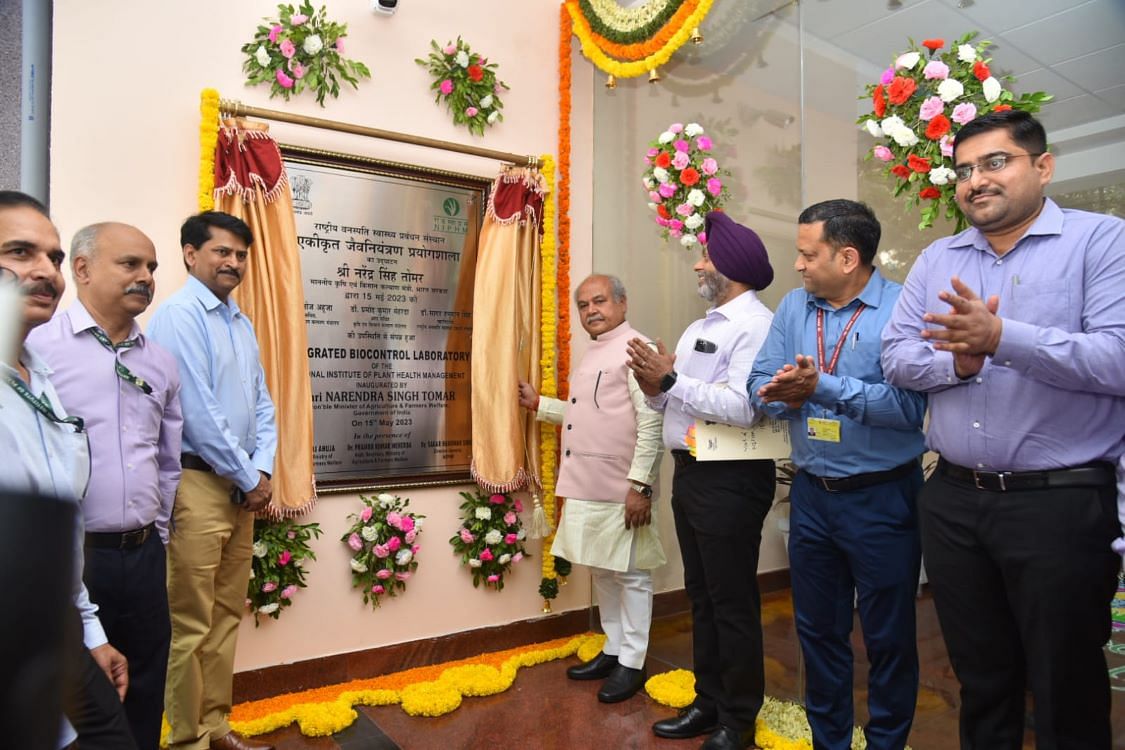
During the inauguration, Minister Tomar emphasized the importance of utilizing biocontrol methods to combat the negative impacts of excessive pesticide use in various crops. He stressed the need to reduce cultivation costs and increase farmers' income through the adoption of biocontrol techniques.
Additionally, Minister Tomar highlighted the significance of disseminating the technologies developed in the laboratory to farmers who have limited access to information, ensuring they understand the benefits of these advancements. He also underscored the necessity of eliminating pesticide residues in organically produced agricultural commodities exported to foreign markets to maintain the country's brand image.
Manoj Ahuja, IAS, Secretary of the Department of Agriculture and Farmers Welfare (DA&FW), Raghunandan Rao, IAS, Secretary of the Ministry of Agriculture, Government of Telangana, Dr. Pramod Kumar Meharda, IAS, Additional Secretary of DA&FW, Dr. Sagar Hanuman Singh, Director General of NIPHM, senior officers from central and state governments, ICAR institutes, trainee officers, and students were present at the ceremony.
The newly inaugurated Integrated Bio Control Laboratory (BC Lab) at NIPHM is a state-of-the-art facility that provides hands-on experience in the production of biopesticides, biocontrol agents (such as predators and parasitoids), entomopathogenic fungi, biofertilizers, NPV, pheromones, and botanicals. By promoting the use of biocontrol agents, biopesticides, and biofertilizers, the lab aims to reduce reliance on chemical pesticides and fertilizers.
This approach will help mitigate their adverse effects on the environment and human health while contributing to improved soil and plant health. The BC Lab also features an Insect Museum, weed museum, exhibition hall, and Natural Farming Cell, which showcase agriculturally important insect and weed specimens in preserved or live forms.
Equipped with state-of-the-art equipment and staffed by highly qualified faculty members, the Integrated Biocontrol Laboratory at NIPHM promotes sustainable agricultural practices such as Agro Ecosystem Analysis (AESA) and Ecological Engineering (EE) for pest management.
NIPHM conducts regular training programs on various aspects of insect pest and disease management in different crops. These training programs are attended by officers from different states, scientists, academicians from Agricultural Universities, Krishi Vigyan Kendras (KVKs), ICAR institutes, students, farmers, the Department of Plant Protection, Quarantine & Storage (DPPQ&S), and private organizations.

Prior to the inauguration, Narendra Singh Tomar, along with the Agriculture Minister of Telangana, Singireddy Niranjan Reddy, Secretary of A&FW, Manoj Ahuja, APC Telangana, Raghunandan Rao, Cyberabad Police Commissioner, Stephen Raveendra, and other senior officials from the Government of India and the Government of Telangana, reviewed the preparations for the upcoming G20 Agri Ministers Meeting scheduled for May 15, 2023, at Novotel Hyderabad.
The NIPHM offers a range of capacity-building programs focused on Plant Health Management. These programs include the Post Graduate Diploma in Plant Health Management (PGDPHM), Certificate Course on Plant Health Management in Organic Farming, Good Agricultural Practices (GAP) for different crops, Field Diagnosis & Management of Plant Parasitic Nematodes, On-Farm production of Bio-inputs, Production protocols for Biofertilizers & Biopesticides, Production protocols for Predators & Parasitoids (natural enemies of insect pests), Production protocol of Entomopathogenic Nematodes, Locust Pest Management, Advances in Weed Management, and Quality control of microbial biopesticides.
The establishment of this facility marks a significant milestone in India's journey towards chemical-free and sustainable agriculture. It will support extension functionaries in promoting non-chemical pest management options for agricultural and horticultural crops. The trained officers will then pass on their knowledge to farmers in their respective areas, encouraging the adoption of sustainable agricultural practices and the use of eco-friendly pest management techniques.
Additionally, this facility will contribute to enhancing the knowledge and skills of agriculture officers, extension officers, and farmers in the areas of soil health management, organic farming, and natural farming across the country.
(Source: PIB)
















